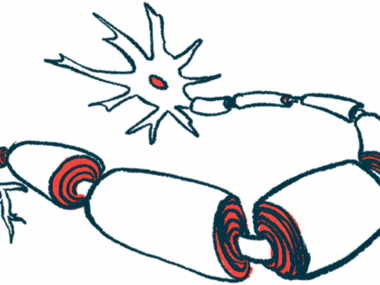#AANAM – Ublituximab Reduced Relapse Rate, Disability Progression in Twin Trials
Written by |

Editor’s note: The Multiple Sclerosis News Today team is providing in-depth coverage of the 2021 Virtual AAN Annual Meeting, April 17–22. Go here to read the latest stories from the conference.
Ublituximab, an investigational therapy for relapsing forms of multiple sclerosis (MS), significantly outperformed Aubagio (teriflunomide) at reducing patients’ annualized relapse rates and lowering the number of brain lesions over nearly two years, according to data from the ULTIMATE clinical trials.
Those findings were presented by Lawrence Steinman, MD, a professor of neurology at Stanford University in California, at the recent 2021 American Academy of Neurology virtual meeting, which ends today. The poster was titled, “Efficacy and safety of ublituximab versus teriflunomide in relapsing multiple sclerosis: Results of the Phase 3 ULTIMATE I and II trials.”
“The results of the ULTIMATE I and II studies show that not only did ublituximab effectively reduce relapses in patients with RMS, but had a profound effect on suppressing inflammatory activity,” Steinman, the global study chair for the two trials, said in a press release.
TG Therapeutics, the medicine’s developer, intends to use these data to support a biologics license application, requesting ublituximab’s approval for relapsing forms of MS, in the third quarter of the year.
Ublituximab is an antibody designed to prevent B-cells from triggering the inflammation that causes nerve cell damage in MS. It does so by targeting a protein found on B-cell surface, called CD20.
The therapy, administered directly into the bloodstream, is said to have superior potency compared with current anti-CD20 antibodies, allowing for the use of lower doses and shorter infusion times.
The identical Phase 3 ULTIMATE 1 (NCT03277261) and ULTIMATE 2 (NCT03277248) studies compared ublituximab’s safety and effectiveness to that of Aubagio in a total of 1,094 adults with relapsing forms of MS and active disease.
Participants received a 150 mg ublituximab infusion delivered over four hours on their first day of treatment, followed by a one-hour 450 mg infusion on day 15, before receiving the treatment at the 450 mg dose every six months.
Top-line results presented last year showed that, compared with Aubagio, ublituximab significantly reduced patients’ annualized relapse rate (ARR) in both trials — 0.188 vs. 0.076 relapses per year in ULTIMATE I, and 0.178 vs. 0.091 relapses in ULTIMATE II. This corresponded to a 60% and 50% reduction in the risk of relapses, meeting the trials’ main goal.
The data presented at the AAN meeting now showed that patients benefitted more from ublituximab than Aubagio in a number of additional efficacy measures.
In fact, ublituximab lowered the number T1 lesions (areas of active, ongoing inflammation in the brain) by more than 95% in both trials, and of new or enlarging T2 lesions (regions of brain damage, regardless of whether there is ongoing inflammation at the time of the scan) by more than 90% after the 96-week trials.
Also, more than 40% of patients in both trials had no evidence of disease activity over the 96 weeks, which corresponded to a 198% improvement over Aubagio in ULTIMATE I and 277% in ULTIMATE II.
Overall, pooled disability progression results showed that patients on ublituximab had similar rates of confirmed disability progression at 12 and 24 weeks, compared with rates for Aubagio.
Conversely, the proportion of patients experiencing a confirmed improvement in their disability scores (less disability) was much higher among patients receiving ublituximab, both at 12 weeks (12% vs. 6% for Aubagio), and at 24 weeks (9.6% vs. 5.1%).
Ublituximab was generally well-tolerated and associated with similar rates of adverse side effects as Aubagio — approximately 88% in each group.
The most common adverse side effect with ublituximab was infusion-related reactions — 47.7% of patients receiving ublituximab experienced at least one such reaction, versus 12.2% of those receiving Aubagio.
Headaches were the next most common side effect in each group (25.2% vs 30.3%), followed by colds (17.5% vs 17.8%). Two cancers and two deaths occurred in the ublituximab-treated group, compared to one of each in the Aubagio group.
“Taken together, historically low ARRs, marked reductions in brain lesions and very low rates of confirmed disability progressions resulted in nearly half of the patients treated with ublituximab achieving no evidence of disease activity, a goal we strive for when treating our patients with [relapsing MS], which continues to be a challenge to achieve,” Steinman added.
“Today represents an exciting day for [relapsing] MS patients who continue to need efficacious and convenient treatment options,” Steinman said.


